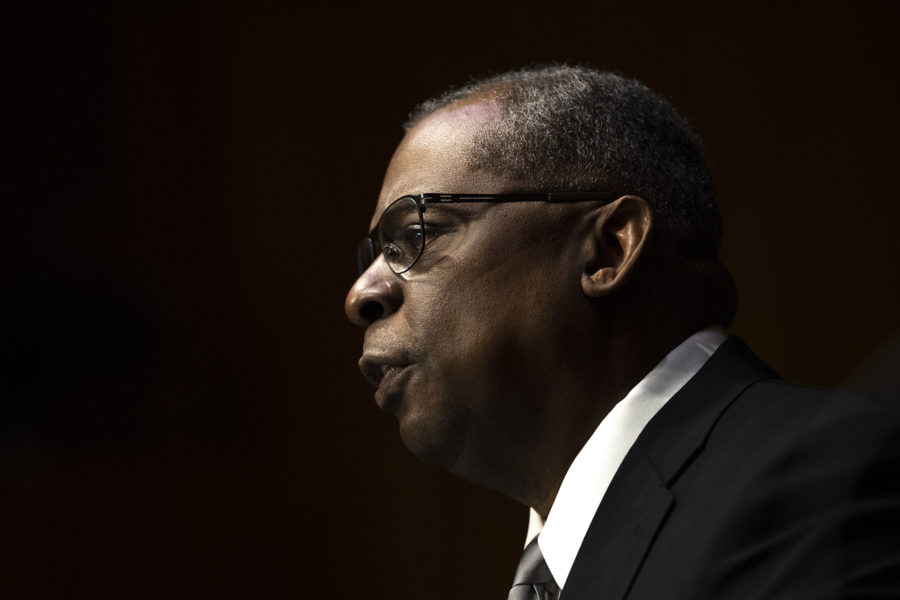Lloyd Austin was sworn in as Defense Secretary on Jan. 22, shortly after the Senate confirmed his nomination, becoming the first Black person to hold the position. He assumes the top Defense Department job just one day after Congress approved a waiver allowing him to lead the Pentagon five years after he retired from Active duty.
Austin, who retired in 2016 as the four-star commander of U.S. Central Command after 40 years in service, becomes President Joe Biden’s Defense Secretary after a quick and relatively easy confirmation process, despite consternation from many lawmakers about the further erosion of civilian oversight of the military.
The Senate’s confirmation vote of 93-2 came the day after the chamber approved the waiver by a vote of 69-27, avoiding the seven-year “cooling off” period required for military officials to become the civilian leader of the Pentagon. The Senate moved quickly, voting immediately after the House approved the waiver by a vote of 326-78, with 28 not voting. Republican Sens. Mike Lee of Utah and Josh Hawley of Missouri voted no on the nomination.
Immediately following the vote, Austin was administratively sworn in at the Pentagon and had several meetings to prepare him for his new role, including an intelligence briefing, a briefing on COVID-19 with service Secretaries and combatant command leaders, a phone call with NATO Secretary General Jens Stoltenberg, and operational briefings about China and the Middle East.
White House spokeswoman Jen Psaki said Vice President Kamala Harris will ceremoniously swear in Austin during an event Jan. 25 at the White House.
In a message to the force, Austin wrote that he is “honored to have this chance to serve again and to do so alongside you and your families.” He said his job is to make the military more effective at doing its job.
“That means ensuring you have the tools, technology, weapons, and training to deter and defeat our enemies,” he wrote. “It means establishing sound policy and strategy and assigning you clear missions. It means putting a premium on cooperation with our allies and partners. And it means living up to our core values, the same ones our fellow citizens expect of us.”
Austin said told troops their mission to help the country overcome the COVID-19 pandemic will continue.
“None of us succeeds at this business alone. Defending the country requires teamwork and cooperation,” he wrote. “It requires a certain humility, a willingness to learn, and absolute respect for one another. I know you share my devotion to these qualities. I am proud to be back on your team.”
Austin met with House leaders behind closed doors shortly before the waiver vote on Jan. 21, and multiple lawmakers changed their minds to approve the waiver after the meeting. Austin spent a large portion of his Jan. 19 confirmation hearing attempting to assure lawmakers he is committed to ensuring civilians control the military.
“I would not be here asking for your support if I felt that I was unable or unwilling to question people with whom I once served, in operations I once led, or [if I was] too afraid to speak my mind to you or the President,” Austin told Senators.
The confirmation makes history as Austin becomes the first Black Defense Secretary, just about six months after Air Force Chief of Staff Gen. Charles Q. Brown Jr. became the military’s first Black uniformed service leader.
Throughout his career, Austin also served as the vice chief of staff of the Army, the commanding general of U.S. Forces-Iraq, and the director of the Joint Staff, among many other assignments. After retiring, he served on the board of Raytheon Technologies and told Senators in the hearing that he would recuse himself from decisions related to the company for the entirety of his term, even though the requirement is just one year.
“We congratulate Lloyd Austin on assuming his new job as Secretary of Defense,” said Air Force Association President and retired Air Force Lt. Gen. Bruce “Orville” Wright. “It was an honor to serve with him not too many years ago in the Pentagon, and I look forward to working with him now as he leads our Department of Defense.”
Editor’s Note: This story was updated at 2:30 p.m. on Jan. 22 to include additional information about Austin’s swearing in and his first memo to the force.


